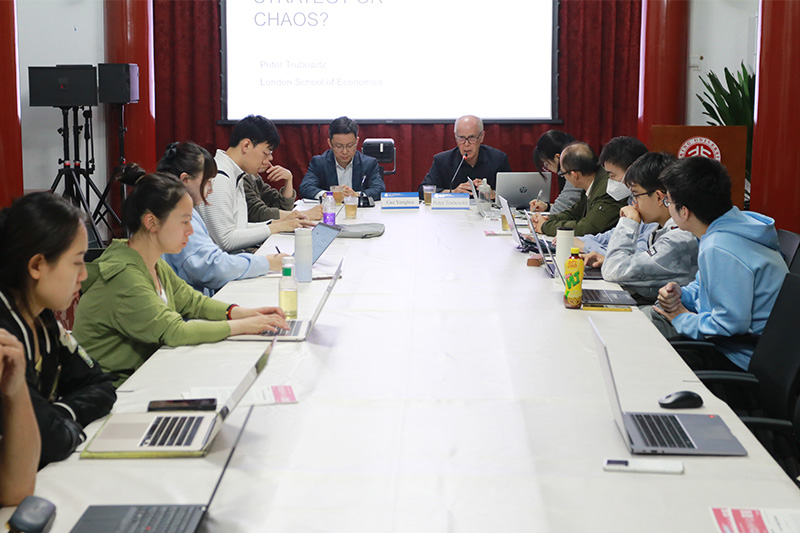
On the evening of April 22, 2025, the Institute of International and Strategic Studies (IISS), Peking University (PKU) successfully held the 86th session of the “North Pavilion Seminar” lecture series. Peter Trubowitz, Professor of International Relations at the London School of Economics and Political Science (LSE) and Director of the Phelan United States Centre, delivered a lecture titled “Trump 2.0: Strategy or Chaos?” The lecture was chaired by Gui Yongtao, Vice President of the IISS, PKU, and attended by Jie Dalei, Associate Professor at the School of International Studies, PKU.
Professor Trubowitz observed that since Trump’s second inauguration, he has rolled out a string of radical and at times contradictory policies — from slapping additional tariffs on most countries and pressuring traditional allies to shifting Washington’s posture toward Moscow. He noted that these seemingly chaotic moves can be interpreted from three different perspectives.
From an international perspective, Trump is seeking to reshape the global order to protect U.S. interests and maximize national security and influence. This view underscores the dual character of his approach: on the one hand, strategic retrenchment aimed at shedding outdated commitments; on the other, an expansionist pushes to capture economic high ground. While this “retrenchment–expansion” paradox gives rise to policy contradictions, it ultimately reflects a pragmatic calculation of national interest.
From the perspective of domestic politics, the turbulence in Trump’s foreign policy mainly stems from divisions within the “Make America Great Again (MAGA)” coalition—namely, the populist faction (represented by former White House adviser Steve Bannon) and the techno-globalist faction (represented by Elon Musk). The contradictions between these two camps have grown increasingly sharp over issues such as immigration policy (e.g., H1-B visas) and the degree of toughness toward China. However, this perspective tends to view Trump as a passive prisoner of political struggles, overlooking his active tendency to stir up chaos.
From the perspective of personal traits, Trump treats foreign policy as an extension of domestic politics, with the core aim of consolidating his own power. Tearing up agreements, subverting norms, and sowing uncertainty are all tactics to serve his political ends. In other words, Trump rejects notions such as “the United States facing equal competitors” or “a multipolar world,” but instead pursues a strategy of “predatory hegemony”.
As to whether Trump’s second-term policies are carefully calculated or recklessly arbitrary, Professor Trubowitz concluded that the essence of his foreign policy is to generate chaos in order to force opponents into compromise — chaos is the strategy. At the same time, he emphasized that such a strategy will inevitably be constrained by domestic backlash and strategic overreach, making it difficult to sustain.
During the interactive session, Professor Trubowitz engaged with faculty and students on topics such as the linkages between Trump’s domestic and foreign policies, the “deep state” narrative, the tactic of “flood the zone” with information, and the similarities between Trump’s policies and behavior and those of Richard Nixon.
(Contributed by: Shih Wenlv)
Editor: Li Fangqi Photographer: Zheng Huaizhou

